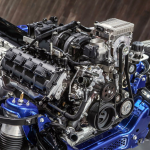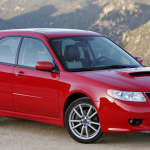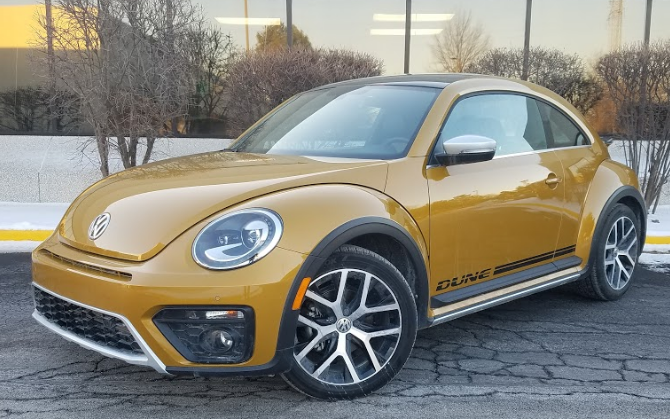
 2018 Volkswagen Beetle Dune
2018 Volkswagen Beetle Dune
Class: Sporty/Performance Car
Miles driven: 230
Fuel used: 8.1 gallons
Real-world fuel economy: 28.4 mpg
| CG Report Card | |
|---|---|
| Room and Comfort | B |
| Power and Performance | B- |
| Fit and Finish | B |
| Fuel Economy | B+ |
| Value | B |
| Report-card grades are derived from a consensus of test-driver evaluations. All grades are versus other vehicles in the same class. Value grade is for specific trim level evaluated, and may not reflect Consumer Guide's impressions of the entire model lineup. | |
| Big & Tall Comfort | |
| Big Guy | B |
| Tall Guy | B |
| Big & Tall comfort ratings are for front seats only. "Big" rating based on male tester weighing approximately 350 pounds, "Tall" rating based on 6'6"-tall male tester. | |
Driving mix: 50% city, 50% highway
EPA-estimated fuel economy: 26/34/29 (city/highway/combined)
Base price: $26,790 (not including $850 destination charge)
Options on test vehicle: Sandstone Yellow Metallic paint ($250)
Price as tested: $27,890
Quick Hits
The great: Unique character, both inside and out
The good: Powertrain performance, good passenger/cargo room for the class
The not so good: Rear seat and trunk space still tight
John Biel
The sands of time haven’t run out on the Volkswagen Beetle Dune. Expressively outfitted and vibrantly colored (if you pop for the extra-cost Sandstorm Yellow Metallic paint), this dune-buggy-inspired “Bug” enters its third model year in 2018 with some key upgrades.
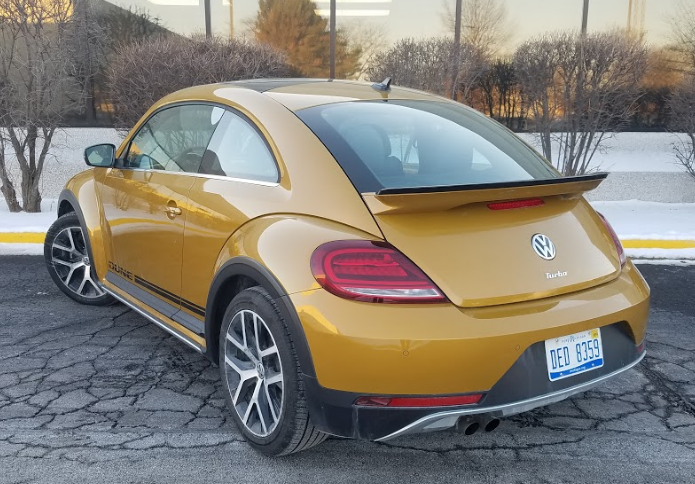
The Dune coupe bowed in 2016 with a slightly elevated ride height and wider stance than other Beetles, a black-edged decklid spoiler, black wheel-lip and lower-body cladding, exclusive bumper and air-intake designs, and LED taillights. Inside was a specific gray-and-black interior scheme with yellow stitching and seat piping, and yellow-rimmed instrument dials. It had the aura of a short-term limited edition, the kind of thing that’s created to draw some attention to a “mature” product line for a year, then disappear to make way for a new “halo” model. Not so the Dune — it added a convertible companion in 2017 and comes back for ’18 with a new engine and added standard equipment
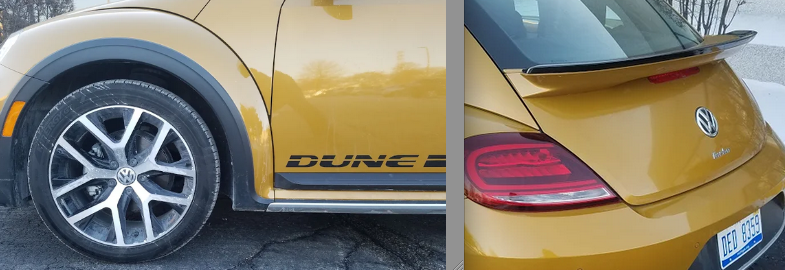
Where previous Dunes shared a 170-horsepower 1.8-liter turbocharged four-cylinder engine with most other Beetles, the new one switches to a 2.0-liter turbo four now used by all Bugs. It makes 174 horsepower at 5000 rpm and 184 lb-ft of torque at a low 1500 revs, and delivers fairly snappy off-the-line punch. It cruises easily enough on the highway, but struck this driver as a little shy to dig in and go from moderate speed to outright fast when the pedal was tromped. The sole transmission for Beetles is a 6-speed Tiptronic automatic that performs well.
The EPA projects fuel economy from this powerteam at 26 mpg in city driving, 34 mpg in highway running, and a combined 29 mpg — all improvements on the ratings for the 1.8-liter engine. However, in this driver’s turn with Consumer Guide®’s test Dune coupe, a 118-mile stint that was 55 percent city-type operation, it returned a lukewarm 23.5 mpg.
There’s more stuff in the latest Dune, too. The contents of previous lighting and technology option packages are now standard at a starting price of $26,790 for the coupe and $32,090 for the convertible. Thus, in addition to the components previously discussed, CG’s test car sported 18-inch alloy wheels; heated power exterior mirrors; automatic Bi-Xenon headlights; rain-sensing windshield wipers; power sunroof; dual-zone automatic air conditioning; leather-wrapped steering wheel, shifter knob, and parking-brake handle; heated front sport seats; adjustable ambient lighting; touchscreen-controlled Fender audio system with HD radio, satellite radio, CD player, and voice control; Bluetooth connectivity; VW Car-Net smartphone-app integration; keyless entry to doors and trunk; push-button starting; rearview camera; electronic parking assist; blind-spot monitor; and rear cross-traffic alert. With only the gold paint and delivery added, the test car stickered at $27,890.

The look and feel of this latest Dune is right in line with previous examples that CG has sampled. About the only thing that truly bothered this reviewer on the 2018 test car was a rattling cargo cover that defied attempts to make it seat well enough to quiet down. Otherwise, there’s virtually no change to cabin materials (lots more hard plastic than soft-touch surfaces) or controls—especially the simple, intuitive audio settings. Climate controls mix helpful temperature and fan-speed dials with a number of function buttons. The cloth-and-leatherette front seats are comfortable and provide good support, but rear seat backs are quite upright. Headroom is good in front but is definitely limited to sub-6-footers in back.
Test Drive: 2016 Mini Cooper S Clubman
Upper and lower glove boxes are particularly helpful for cabin storage because there’s no cubby in the center console, just a tiny covered space built into the armrest. Other spaces are a small open bin at the front of the console under the USB and auxiliary ports, door pockets, pouches on the back of the front seats, and small rear-sidewall pockets. There are twin cup holders in the console for front-seat occupants, but just one for rear-seaters.
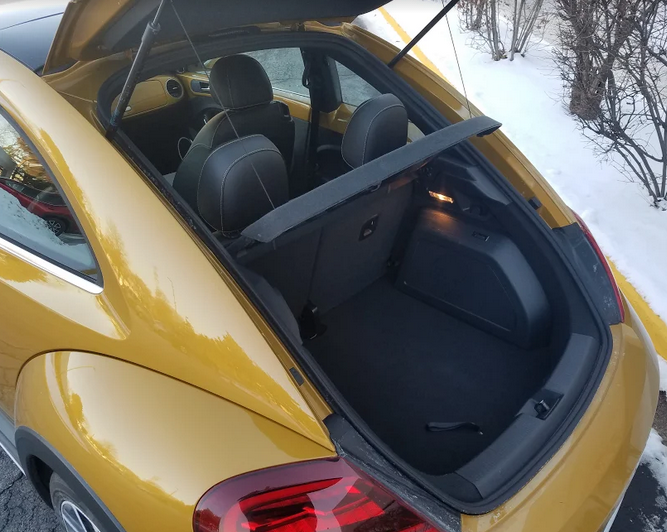
The trunk will snugly hold a weekend’s soft luggage for two, or a week’s worth of their groceries. Rear seats fold in a 50/50 split for added cargo space, but they don’t rest fully flat, and they sit at some height above the trunk floor.
Maneuverability is aided by light, variably assisted steering. With its modified stance, the Dune handles better than it rides, but it’s hardly a torture device.
Now absent the hotted-up R-Line model of recent years, it’s the Dune’s chassis modifications and aggressive style touches that make the case for the VW Bug’s place in the sporty/performance category. Maybe that’s why this Beetle has legs.
Rick Cotta
What the Beetle Dune sacrifices in practicality it more than makes up for with charisma.
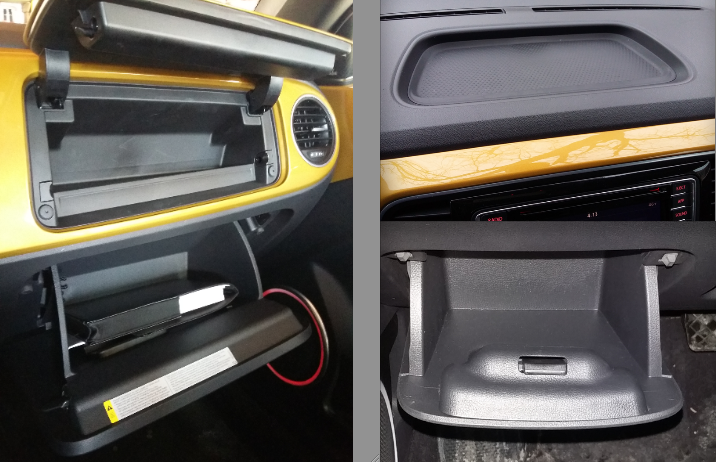
But that said, there are a surprising number of practical features packed into the Beetle Dune as well, along with any number that are just plain cool. Since describing them all would make for a long, boring laundry list, perhaps it’s best to embrace the old adage, “A picture says a thousand words,” and let some photos tell most of the story.

Often I’ll be driving test vehicles at night and get “flashed” by oncoming cars when my brights aren’t on. A handy dial under the light switch (left) allows you to adjust headlight height (center), something I wish more cars offered. Right: Peek-A-Boo! Another cool feature I discovered — strictly by accident — was that the rearview camera is hidden under the round “VW” badge on the trunklid (the badge also serves as the trunk release — neat itself), preventing the lens from getting dirty in slushy weather. Veeeery clever.
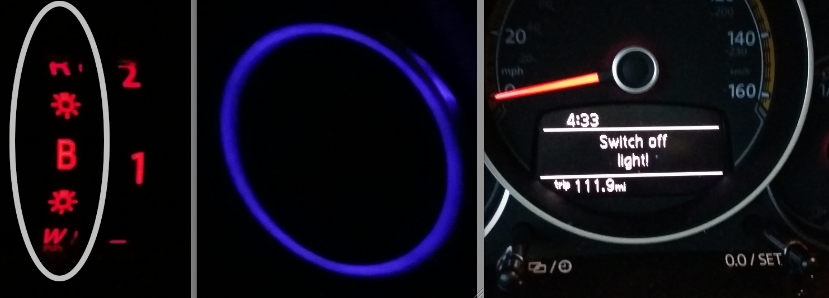
Another dial on the lighting panel (left) allows you to choose the glowing color that surrounds the door speakers (center), giving you a choice of red, blue, or white. Right: Another light-related nicety. Instead of just sounding a chime — which is the equivalent of a six-month-old crying (What the heck do you want?) — the Beetle tells you exactly what’s wrong.
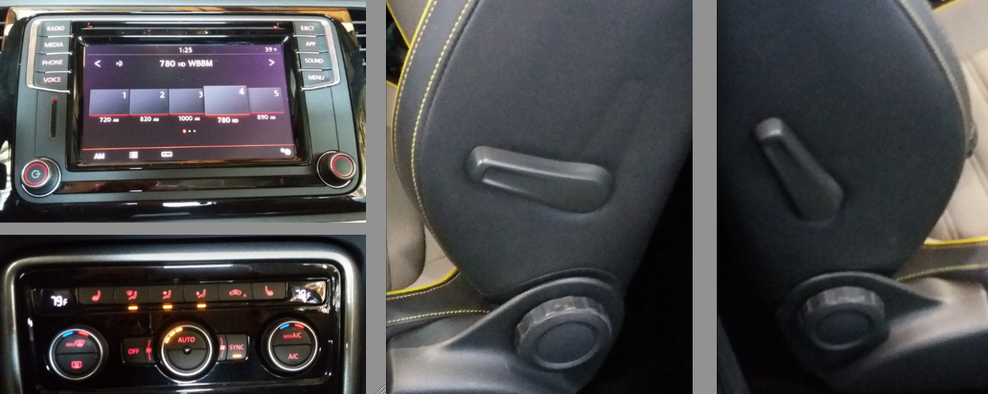
The Beetle’s infotainment controls (top left) are exceptionally easy to decipher and use, as are the climate controls (bottom left). The latter allow you to select defrost, dash vents, and floor vents all at the same time (three little lights in the center), an unusual luxury I really like. Something else to like: Both the driver seat and front-passenger seat include lumbar adjustment, the latter a very rare — and much appreciated — feature in the class.
That didn’t take long now, did it?

